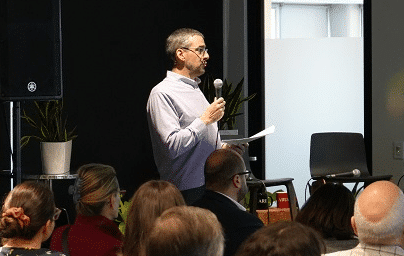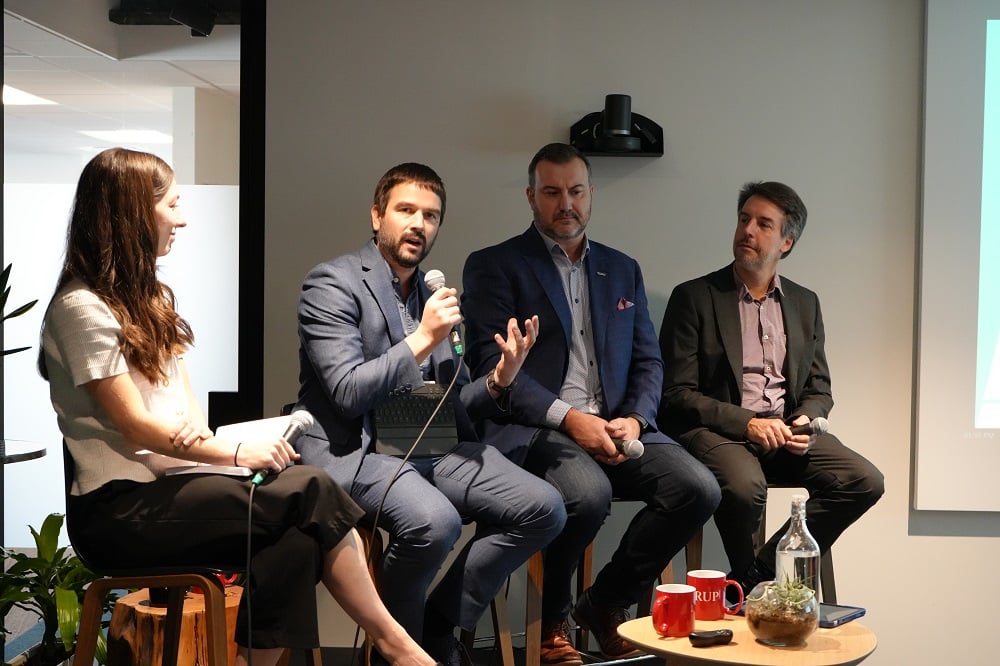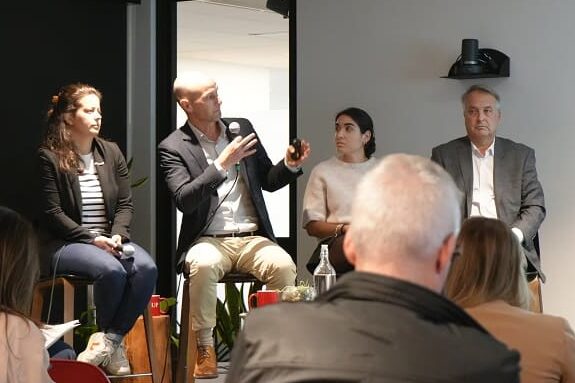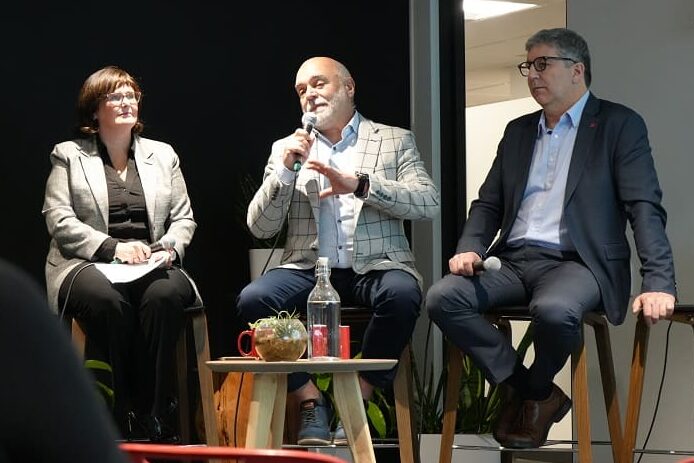Accelerating to Zero, in Quebec
- Theme
- Learn
CAGBC was in Montréal on November 7 for its first Quebec Accelerating to Zero™ Summit, an event focused on challenges and opportunities of decarbonizing buildings in Quebec. Hosted at the Arup Canada Montréal office, this sold-out event featured thought-provoking sessions designed to stimulate decarbonization conversations, covering global carbon reductions, good grid citizenship, asset valuation and access to sustainable finance.
Quebec is among the provinces leading in green building certification, with Montréal being a forerunner among major urban centers, thanks to ambitious policies aiming at reducing energy consumption and emissions from buildings. But as the experts gathered pointed out, the Quebec building sector will need to think long term while capitalizing on quick wins, to reach its climate objectives.
A tool to navigate change
The summit kicked off with an overview of the latest updates to the Zero Carbon Building– Design Standard™ by Mark Hutchinson, CAGBC’s Senior Vice President, Green Building Programs & Innovation. The recent updates to the ZCB-Design Standard were made to reflect evolving market needs and to take advantage of new technologies and processes that will accelerate carbon emissions reductions. One key area of focus for the changes to the Standard focused on the interaction between buildings and the energy grid.
“When it comes to decarbonization, good grid citizenship is a key element, which is why the ZCB-Design v.4 focuses on reducing peak consumption while ensuring energy consumption targets are within reach,” said Hutchinson.

Electrification and reducing energy consumption were front and center in this discussion. Panelists including Etienne St-Cyr, Head of Energy Monitoring at Hydro Quebec, Marc-André Godbout, Energy Expertise Director at Énergir, Philippe Hudon, President and Founder at Akonovia, and Stephanie Breton, Technical Lead at Dunsky Énergie + Climat were unanimous on the importance of reducing grid stress and congestion through more energy efficient buildings.
“There is a limit to energy creation. The solution is to reduce consumption,” said St-Cyr. “Today we see congested sectors across our cities and compressing demand can give a greater number of people access to the network and ultimately achieve energy transition.”
In the current context, tools such as CAGBC’s ZCB Standards can help property owners, project teams, building operators and investors navigate electrification.
“In three years, we have gone from abundance to tighter balance sheets. The asset management landscape has changed for all stakeholders, especially in terms of costs. The solutions are there, we just need to change our perspective,” said Akonovia‘s Philippe Hudon.

Setting the path
In the second session, Valérie Anne Brouillard, Senior Environment and Climate Change Engineer at the Bureau de la transition climatique et énergétique of the ministère de l’Environnement du Quebec , Catherine Langlois, Development Director at SOFIAC, Conan O’Connor, Project Direcor at Purpose Building, and Sylvain Lepage, Chief Executive at Fédération québécoise des municipalités, focused on how transition planning can support the move to zero carbon buildings. Panel members shared their perspectives and experience in transition planning on retrofit projects, agreeing that thinking strategically allows a balance in leveraging regulations to unlock asset value.
“Codes and regulations are evolving, and public and institutional buildings must set an example as laws come into force to encourage and support large-scale decarbonization,” explained Brouillard.
As new building regulations come into effect, funding should be made available. However, mastering regulatory and funding frameworks can be daunting for first timers. That’s where companies like SOFIAC can offer guidance and unlock funds to support projects from design to delivery through a performance-based approach that requires no investment and where project costs are reimbursed solely through a portion of generated savings. Catherine Langlois provided a brief overview of how financial, technical and operational barriers can be removed with a sound decarbonization action plan that includes specific energy-efficiency targets.

Investing in the future
The final panel featured Serge Cormier, Vice President of Value Creation, ESG and Construction at the Fonds immobilier de solidarité FTQ, Josée Lupien, President at Vertima and François Morin, Director, Commercial Banking, Real Estate Financing at the National Bank of Canada focused on access to financing for decarbonization projects. Investors are increasingly considering green buildings as a safer bet, with public and private funding being made available to new developments and retrofit projects. Securing funds could be made easier if real estate valuations considered sustainability investments appropriately.
“Just as in the green building industry, investors in the financial sector are looking to the future. To ease the transition, we need valuation models that better predict the value of green assets,” said Cormier.

Panelists emphasized that from a finance standpoint, it pays to tackle carbon today. Businesses want to be associated with green initiatives and are adopting ESG principles, which makes green initiatives attractive. Further, more and more financial institutions and investors are including sustainability in their decision-making process for loans and other financial products. Projects must do their due diligence and prove they are worthy of investors’ confidence. Assessment models must also evolve to better judge the value of a building and that’s where a trusted standard like ZCB-Design comes in handy. The Investor Ready Energy Efficiency™ (IREE) certification is another tool project teams can use to support their case for funding proposals with independent third-party validation that a project has been developed by qualified project developers and conform to the requirements of the Investor Confidence Project Protocols.
The event concluded with a networking reception that kept the discussion going in a relaxed atmosphere. CAGBC would like to thank all panelists for their involvement summit sponsors Mitsubishi Heating and Cooling and Arup for their support, and attendees.